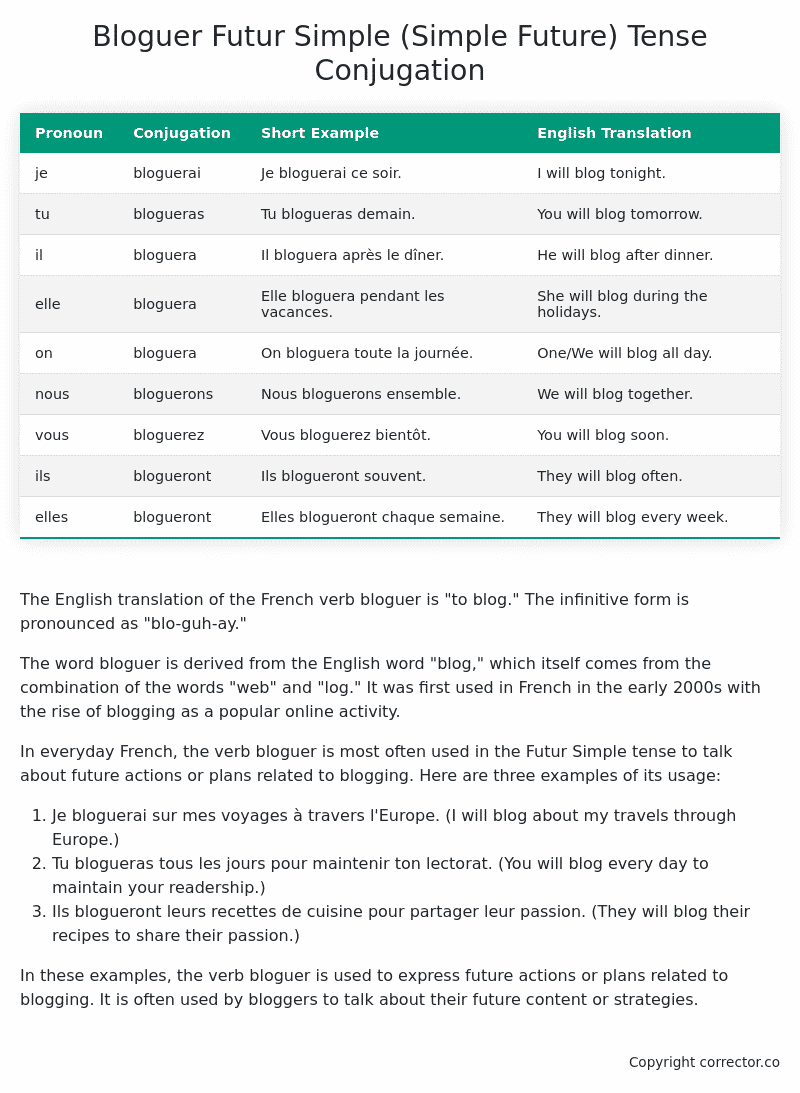Futur Simple (Simple Future) Tense Conjugation of the French Verb bloguer
Introduction to the verb bloguer
The English translation of the French verb bloguer is “to blog.” The infinitive form is pronounced as “blo-guh-ay.”
The word bloguer is derived from the English word “blog,” which itself comes from the combination of the words “web” and “log.” It was first used in French in the early 2000s with the rise of blogging as a popular online activity.
In everyday French, the verb bloguer is most often used in the Futur Simple tense to talk about future actions or plans related to blogging. Here are three examples of its usage:
- Je bloguerai sur mes voyages à travers l’Europe. (I will blog about my travels through Europe.)
- Tu blogueras tous les jours pour maintenir ton lectorat. (You will blog every day to maintain your readership.)
- Ils blogueront leurs recettes de cuisine pour partager leur passion. (They will blog their recipes to share their passion.)
In these examples, the verb bloguer is used to express future actions or plans related to blogging. It is often used by bloggers to talk about their future content or strategies.
Table of the Futur Simple (Simple Future) Tense Conjugation of bloguer
| Pronoun | Conjugation | Short Example | English Translation |
|---|---|---|---|
| je | bloguerai | Je bloguerai ce soir. | I will blog tonight. |
| tu | blogueras | Tu blogueras demain. | You will blog tomorrow. |
| il | bloguera | Il bloguera après le dîner. | He will blog after dinner. |
| elle | bloguera | Elle bloguera pendant les vacances. | She will blog during the holidays. |
| on | bloguera | On bloguera toute la journée. | One/We will blog all day. |
| nous | bloguerons | Nous bloguerons ensemble. | We will blog together. |
| vous | bloguerez | Vous bloguerez bientôt. | You will blog soon. |
| ils | blogueront | Ils blogueront souvent. | They will blog often. |
| elles | blogueront | Elles blogueront chaque semaine. | They will blog every week. |
Other Conjugations for Bloguer.
Le Present (Present Tense) Conjugation of the French Verb bloguer
Imparfait (Imperfect) Tense Conjugation of the French Verb bloguer
Passé Simple (Simple Past) Tense Conjugation of the French Verb bloguer
Passé Composé (Present Perfect) Tense Conjugation of the French Verb bloguer
Futur Simple (Simple Future) Tense Conjugation of the French Verb bloguer (this article)
Futur Proche (Near Future) Tense Conjugation of the French Verb bloguer
Plus-que-parfait (Pluperfect) Tense Conjugation of the French Verb bloguer
Passé Antérieur (Past Anterior) Tense Conjugation of the French Verb bloguer
Futur Antérieur (Future Anterior) Tense Conjugation of the French Verb bloguer
Subjonctif Présent (Subjunctive Present) Tense Conjugation of the French Verb bloguer
Subjonctif Passé (Subjunctive Past) Tense Conjugation of the French Verb bloguer
Subjonctif Imparfait (Subjunctive Imperfect) Tense Conjugation of the French Verb bloguer
Subjonctif Plus-que-parfait (Subjunctive Pluperfect) Tense Conjugation of the French Verb bloguer
Conditionnel Présent (Conditional Present) Tense Conjugation of the French Verb bloguer
Conditionnel Passé (Conditional Past) Tense Conjugation of the French Verb bloguer
L’impératif Présent (Imperative Present) Tense Conjugation of the French Verb bloguer
L’infinitif Présent (Infinitive Present) Tense Conjugation of the French Verb bloguer
Struggling with French verbs or the language in general? Why not use our free French Grammar Checker – no registration required!
Get a FREE Download Study Sheet of this Conjugation 🔥
Simply right click the image below, click “save image” and get your free reference for the bloguer Futur Simple tense conjugation!

Bloguer – About the French Futur Simple (Simple Future) Tense
Formation of Futur Simple
For regular -er verbs (e.g., parler – to speak)
For regular -ir verbs (e.g., finir – to finish)
For regular -re verbs (e.g., vendre – to sell)
Common Everyday Usage Patterns
Conditional Statements
Interactions with Other Tenses
Futur Antérieur
Conditional
Present
Summary
I hope you enjoyed this article on the verb bloguer. Still in a learning mood? Check out another TOTALLY random French verb conjugation!


